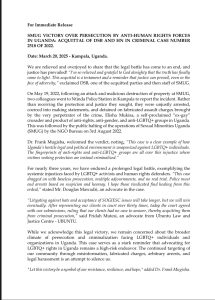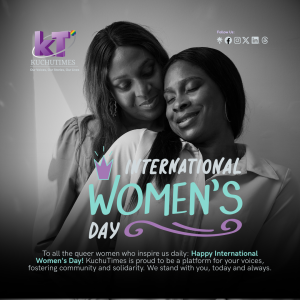President Trump, on Wednesday 26th July, shocked the world when he announced via his official twitter account that the US was banning transgender people from serving in the military.
"After consultation with my Generals and military experts, please be advised that the United States Government will not accept or allow Transgender individuals to serve in any capacity in the U.S. Military. Our military must be focused on decisive and overwhelming victory and cannot be burdened with the tremendous medical costs and disruption that transgender in the military would entail," read the tweet series.
Mr. Trump made the declaration on Twitter, saying that American forces could not afford the “tremendous medical costs and disruption” of transgender service members. He said he had consulted generals and military experts, but Jim Mattis, the defense secretary, was given only a day’s notice about the decision.
The LGBTI community across the globe has since spoken out strongly against this move which is a great retrogression to the rights of sexual and gender minorities. Below a number of transgender persons that have served in the US military share their views on the recent development.
Ashleigh Buch
At first, Staff Sgt. Ashleigh Buch didn’t know what to make of the flood of sympathy that arrived on her cellphone as she got up Wednesday morning.
The first transgender airman to fully transition at Offutt Air Force Base, she hadn’t heard about President Donald Trump’s tweets announcing plans to bar all transgender troops from serving “in any capacity in the U.S. Military.” She logged onto her computer and read the news.
“It was a rush of emotion, pretty much every kind of emotion,” Buch, 32, said in an interview with The World-Herald. “The tears just kept coming and coming. It seemed so surreal.”
Buch went to work at Offutt — where she conducts classes for linguists who fly aboard the 55th Wing’s fleet of reconnaissance aircraft — still in tears, hoping to avoid talking to people. Buch grew up in Fairfield, Iowa, and earned a bachelor’s degree in Spanish and secondary education before joining the Air Force in 2009. She began presenting herself as a woman away from work after arriving at Offutt in 2012 and began transitioning at work early last year, before the Pentagon’s policy was in place.
She has been publicly open about her story, giving interviews to Offutt’s base newspaper and The World-Herald. She has also been mentoring at least four other Offutt service members who have been transitioning under the military’s transgender policy, adopted last year. She met with her commander and her first sergeant on Wednesday. They tried to reassure her, despite all the unknowns.
"It's extremely disappointing. I knew other trans folks when I was in the military. We work really hard, we do our jobs, we have every right to be there. They shouldn't have the president — who, by the way, dodged the draft — making their lives harder when they're serving the nation.
"It was my role as a chaplain's assistant to be a bodyguard for an ordained minister; to transport and move the chaplain from base to base. I was there for soldiers dealing with PTSD or substance abuse issues or divorce, all the other issues that come from war trauma, and we basically took care of about 800 soldiers.
"We faced a lot of rocket attacks in Iraq. For a while, we would get rocketed every Thursday night.
"My family has been defending America since before there was an America. Military service and love of country are bound up together very tightly, part of having all the benefits of democracy that include — I believe — there being rights to protections for transgender people and other gender minorities. Part of that is bound up in putting your life on the line for your country.
"I always knew I was a girl, I had made some small attempts at transitioning, but had just faced tremendous resistance. Either there was no trans health-care available, or if there was, you had to go to providers who had really bizarre negative understandings of trans people and thought this was a disease.
"We deserve full access to all the rights, responsibilities and burdens of citizenship. One of those rights, responsibilities and burdens is military service. And by God, we're good soldiers. We're not magic, we're not special, we just deserve the same rights that everybody else gets."
Janice Covington, 69
U.S. Army, 1964-67
Transitioned
"I was almost captured one time. I laid in a ditch on the side of the road, it was total darkness and there were three Viet Cong came along with AK-47s and they were four feet from me and they didn't see me. I just had a side pistol, a 45 Colt. I could see their silhouettes in the darkness. I could hear my heartbeat. You ever been that scared? So scared you could hear your own heartbeat?
"I was in the Army. I was in Vietnam in '65 and '66, and discharged in '67. Back then, I couldn't come out. I didn't even know if another transgender person existed in this world. We didn't have internet, we didn't have communication.
"I survived, but I got wounded in 1966. I got shot in my left leg and I spent three months in the hospital.
"Then I finally came out full time in 2004, because I was just tired of living as a lie. So Janice said, 'I'm coming out full time, people, so watch out.' As for that other fella? He died, if you understand what I mean.
"The thing is, we went to battle, we put our lives on the line, we bleed just like they do. So what's the big deal? I can think of about 15 other countries that allow transgender people to serve in the military openly. We're the land of the free, so why can't we? It's wrong to treat people like that. We're people and we have a right to serve the military if we want to, like anybody else."
Gage Gatlyn, 39
Active Army, Navy, Army Reserves, 1996-2005
Transitioned from female to male
from male to female
"It doesn't matter what's between their legs. Nobody cared as long as I did my job and I did it to the best of my ability, and that's what the other soldiers, the other sailors, looked for.
"This whole thing makes me very angry, but also very sad and distraught at the same time. There's so many soldiers out there; so many people out there who want to be soldiers, and our military is telling them 'No, you can't serve your own country.' That just makes my blood boil.
"I was in the Navy, I was an aviation ordnanceman. I built bombs and missiles and also did small arms on the range. I used to help teach MPs [military police] how to shoot their weapons so they could pass their weapons qualifications. When I was in the Army, I was mortuary affairs technician and basically dealt with death on a daily basis, doing autopsies. It's a hard job, but we have to do it, somebody has to do it. And it has nothing to do with their gender, as long as they're doing the work.
"They're saying everybody's going to run and join the military so they can get their sexual reassignment surgery. Nobody's going to go through basic training, go overseas, fight in Iraq, fight in Syria, then come home and get their surgery. Nobody does that — if they want to serve, they'll serve."
Lara Americo, 32
U.S. Air Force, 2002-2008
Transitioned from male to female
"I was having a rough night last night so I planned to wake up to a piece of strawberry shortcake. I woke up instead to a notification on my phone about trans folks being banned from the military. It was surprising, because we fought so hard to allow gays in the military and I knew for a fact that transgender rights would be next. So I was surprised and saddened.
"I know for a fact there are trans people in the military right now who are hiding and can't reveal who they are, even though people who identify as gay are able to live their lives authentically.
"I was in the Air Force for six years. I had a rough time because being a trans woman is a difficult identity to have when you're enlisted. I had to deal with those issues in basic training. Anybody who knew me knew me as very masculine cis-straight male. Which was not who I was and who I am. I was an MMA [Mixed Martial Arts] fighter and I was lifting weights and doing all the stereotypical male things just so I could blend in and do my job.
"Around 2002, I enlisted. A year prior to that, 9/11 happened, and I was motivated to be a part of the solution and make sure America was a safe place. The biggest danger then was probably people finding out that I was transgender and me losing my job as an airman and being discharged.
"I have Indigenous ancestry, Spanish and Native American. But to be a person of colour myself and a transgender woman who has fought to make this country a safe space — it hurts to live in a country that's not a safe space, that's not equal for trans people.
"I'm afraid that this is only another step in systematically erasing the trans community. And I feel like if we don't stand up, it will be difficult for us to exist in America."
Parts of this article are sourced from omaha.com and cbc.ca




